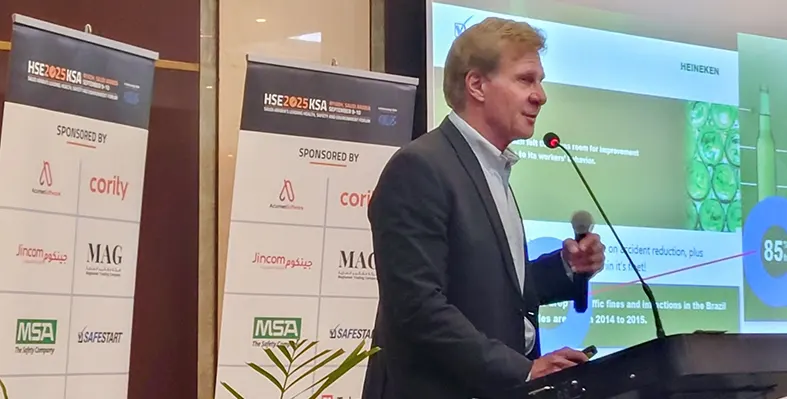As Saudi Arabia’s leading health, safety and environment (HSE) forum unfurled in Riyadh from 9-10 September, insightful panels and presentations gave an idea of the region’s evolving industry
One such session titled ‘From Human Error to Enhanced Performance: The Future of High Reliability Organisations’ spearheaded by Larry Wilson, the Chief Executive Officer of safety solutions provider, Safestart, delved into how the definition of safety has seen a marked shift in recent times.
While safety in workplaces is largely understood as ‘loss control’, with a director or vice president manning the post, focusing solely on prevention, this can pose certain limitations. Employees in a company often find themselves in a fix when trying to get the senior management engaged during loss situations.
But if safety can be taken as a means to attain enhanced performance, it unlocks a fresh perspective beyond just the prevention of injuries or loss to include reduction of human errors, allowing improved production efficiency and quality while reducing scraps and customer complaints.
Wilson spoke on how Safestart is shaping the future of safety by pushing the boundaries of loss prevention. According to him, even the hierarchy of controls in safety can’t always avoid critical errors. The firm addresses these challenges with tools that help get the mind and eyes back on the task, and get into the zone, establishing focus before delivering reliable performance. This spins the concept of loss and safety to generate production. The session also served as a glimpse into Safestart’s upcoming workshop on critical error reduction techniques that will be held in Riyadh from 21-22 October, in association with Offshore Network.
According to Wilson, in the past 25 years, over 5 million people across 75 countries are benefitting from following the critical error reduction technique, which is framed on the basis of state error pattern identification. This pattern, driven by the concept that the states come before the errors, can eliminate 95% of the injuries if identified promptly. While errors are unpredictable, ironically, the states that cause them are actually very predictable, and can be controlled by controlling the mind, moment and performance.
It is possible to anticipate errors by self-triggering on the active states – rushing, frustration, fatigue – the actual feeling in the moment. Self-triggering is the first step to following the critical error reduction approach. One has to promptly think in the lines of ‘eyes, mind, line of fire, balance, traction, grip’. Identifying state error risk patterns makes one think about the risk. In other words, keeping the worst possibilities in mind can help create a quick reflex response. However, self-triggering cannot be achieved if complacent and in a passive state, as it causes the mind to be not on task.
Wilson laid out the primary safety-related habits, based on one’s profession and lifestyle. Snowboarders/ skiers or those who work at height must test their footing and grip before committing to weight.
When driving, it is important to move the eyes first, before moving the hands, feet or body.
Spokespersons from companies which have benefitted from Safestart resources were also present during the session. American multinational corporation, Kimberly Clark, has seen a 74% decrease in recordable injuries and 20% improvement in asset conversion with Safestart’s support.
While Nucor Steel recorded a 53.5% decrease in cost per ton, Scott Forge saw a 40% decrease in customer complaints since the last two years.
Heineken in Brazil recorded an 85% decrease in lost time and recordable injuries, as well as a 50% decrease in traffic fines for their sales people.
Four out of seven plants of Quadrant Plastics saw zero recordable injuries for three years.
Speaking of Safestart’s efficiency in providing region-specific solutions, Wilson said that it is based on neuroscience and works on a train-the-trainer model. The company thus works in collaboration with local trainers to make the experience more tangible and well suited to the respective region’s workplace and culture.






















